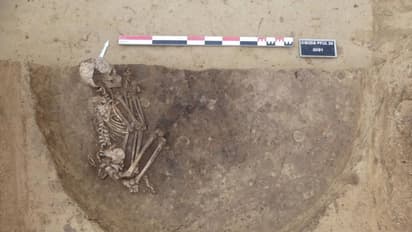Ancient settlement unearthed beneath French farmland: A 6,000-year-old journey through time in pictures

Synopsis
A recent neighbourhood development project on the outskirts of Pfulgriesheim, France, has unveiled a remarkable archaeological site that reveals evidence of human settlement dating back over 6,000 years.
A recent neighbourhood development project on the outskirts of Pfulgriesheim, France, has unveiled a remarkable archaeological site that reveals evidence of human settlement dating back over 6,000 years. According to a news release from the French National Institute for Preventive Archaeological Research (INRAP) dated October 9, 2024, the excavations have identified more than 1,000 structures, showcasing a continuous history of habitation from the late Neolithic period to modern times.
The site, situated between two rivers, contains distinct areas that correspond to various historical periods. Among the earliest findings are silos dating from approximately 4000 to 3400 B.C., characterized by large, round structures that were remarkably well preserved. Some of these silos extend over six feet deep into the ground and were primarily used for food storage. The discovery of significant amounts of burnt cob, likely corn or maize, suggests a substantial settlement that required a considerable food supply. Interestingly, researchers have also identified ten silos that served as burial sites, with human remains and ceramics discovered within.
To further understand the dating of these silos, INRAP researchers plan to conduct carbon-dating analyses on the human remains and pottery found inside.
(Image Credit: Clement Feliu/French National Institute for Preventive Archaeological Research)
(Image Credit: Maxime Walter/French National Institute for Preventive Archaeological Research)
Hunting hypotheses and Iron Age settlements
The excavation site also revealed a set of 60 oblong slots, or thin holes, arranged in parallel bands—an architectural feature commonly found in Neolithic settlements across France. While their exact purpose remains unclear, researchers hypothesize they may have had a role in hunting activities, pending further evidence.
In addition to Neolithic findings, two smaller settlements from the late Iron Age, estimated to be from 480 to 25 B.C., were uncovered. The first Iron Age settlement includes a few silos akin to the earlier designs and features a square-shaped building, indicative of the architectural style of that era. The second settlement, built a few centuries later, is integrated into a slope and likely served as a small agricultural community.
(Image Credit: Simon Diemer/French National Institute for Preventive Archaeological Research)
Middle Ages and 20th century discoveries
The archaeological exploration also revealed significant findings from the Middle Ages. Three circular graves dating back to the seventh century were discovered, including two adjacent graves that formed a single funerary monument. This site contained the intact remains of a man, notable for a spur found in his foot, suggesting he may have been a person of some status or occupation.
The third circular grave, however, no longer featured a tomb, indicating that the body was initially buried under a mound that has since been leveled. The most recent artifacts at the site date back to the 20th century, including remnants of agricultural developments such as hop field anchors and rows of vines.
(Image Credit: Fanny Bricka/French National Institute for Preventive Archaeological Research)
(Image Credit: Yasmine Mechadi/French National Institute for Preventive Archaeological Research)
Ongoing excavations and future research
Researchers at INRAP are committed to continuing excavations at the site, utilizing aerial photographs to gain further insights into the layout and historical significance of the area. The findings at Pfulgriesheim not only enhance the understanding of the region's rich history but also highlight the continuous human presence that has shaped this landscape over millennia.
As the town of Pfulgriesheim, located in northeastern France near the border with eastern Germany, prepares for its new development, the archaeological discoveries serve as a poignant reminder of the deep-rooted connections between past and present communities.
Check the Breaking News Today and Latest News from across India and around the world. Stay updated with the latest World News and global developments from politics to economy and current affairs. Get in-depth coverage of China News, Europe News, Pakistan News, and South Asia News, along with top headlines from the UK and US. Follow expert analysis, international trends, and breaking updates from around the globe. Download the Asianet News Official App from the Android Play Store and iPhone App Store for accurate and timely news updates anytime, anywhere.